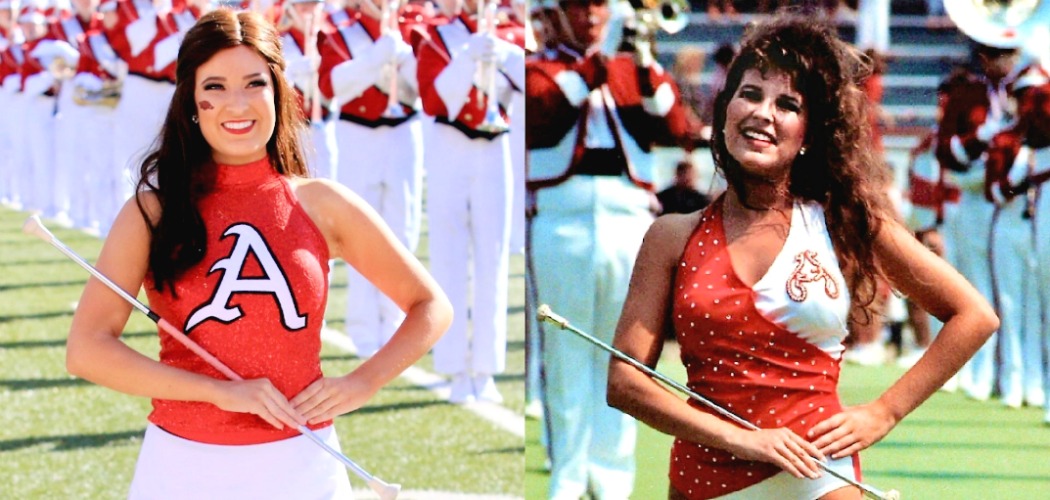[title subtitle=”WORDS Liesel Schmidt
IMAGES courtesy The Udouj Family”][/title]
For most people, the term “baton twirling” conjures images of an energetic girl clad in shiny tights and a spangled, sequin covered uniform marching around with a toothpaste-ad smile, her perky ponytail swinging in time with each step as she maneuvers the baton in her hand through a series of motions choreographed to music. It’s the clichéd version we’ve all seen in the movies, the “talent portion” pulled out by so many beauty queens on pageant stages over the years. But in truth, there’s more to being a majorette than meets the eye; and for former Razorback majorette Melissa Udouj and her daughter, Isabella, twirling that baton is a tradition to wield with pride.
At fifty, Melissa may no longer be marching the college field, but she’s still got that same degree of spirit that kept her fired up, powering through routines while she was twirling from 1987 to 1991 during her years at the University of Arkansas. A communications major at the time, she graduated and went on to become a flight attendant for American Airlines until 2001, when she took on a full-time role as a homemaker, raising her children and coaching young majorettes in the area. Naturally enough, one of those young majorettes was her own daughter, Isabella.
“I myself always had an interest in being a majorette and started when I was in sixth grade,” says Melissa. “I immediately fell in love with it and twirled all through junior and senior high before doing it in college. I always felt special, being a majorette, because it’s not as simple as someone just picking up a baton and twirling it. It takes time and dedication and a real love for doing it to do it well—and being part of Isabella’s journey to becoming a majorette over the years really drove that home for me even more. Seeing her dedicate two to three hours a day, five days a week to training in the gym and witnessing all of her willingness to tackle challenges and persevere was amazing to me. She’s on a whole other level of twirling than I could have ever imagined being, and it’s taken a lot of time, commitment, and sacrifice to reach it.”
Admittedly, when Isabella picked up her first baton, she didn’t have the foresight to understand what becoming a high-level majorette would involve; but somewhere along the way, her love for the art—and her natural talent—took hold and kept her grip firm on the baton, no matter the challenges that could have tripped her up and taken her eyes off the mark. “My mom was the one who thought it would be fun for me to try a few twirling lessons when I was six, and now I’m here!” Isabella recalls with a laugh.
Just where here is isamazing, if you think about it. A nineteen-year-old sophomore who, like her mother, is twirling for the Razorbacks at the University of Arkansas while she pursues her degree—hers, however, is in apparel merchandising and product development—Isabella is indeed a competition-level majorette, having qualified and competed at the National Baton Twirling Association (NBTA) at Notre Dame each year since she was seven years old. Last year, she was a majorette on the line and will be named the new Feature Twirler this year, accomplishing a dream she’s had since she was six years old. In 2011, she won pre-teen Intermediate Miss Majorette of America and later traveled to France to teach baton. Adding to her list of accomplishments worthy of twilling that baton with a smile of satisfaction, in 2017, she was chosen as a United States of America Goodwill Ambassador to Peru, making her one of fourteen baton twirlers chosen to represent the U.S. in Peru for two weeks.
As Melissa will tell you, the sport—and it is, indeed, a sport—has changed since she wore the uniform. “The difficulty level is so much higher now. There’s a lot more body work such as tumbling under high tosses than you saw in years past,” she says.
“It’s such a unique sport,” adds Isabella, who has hopes that one day, the tradition will continue with her own children. “Twirling is essentially dancing and tumbling, but adding in a baton—or batons, as the case may be—makes it ten times harder. It combines many skills into one very difficult yet effortless-looking performance. People who have no idea about baton twirling are amazed by the sport and how much of a ‘wow’ effect it has on audiences.”
And with good reason, as anyone who has ever watched a full routine will undoubtedly admit. Every step, every move is precisely timed so that no spin, no tumble, no toss of the baton or flick of the wrist is off by even a second, as that second could throw everything off balance. “There is no off season for a competitive twirler,” Isabella says of the time she has to put in to stay at the top of her game. “I have to practice all year long in order to keep up my skills as well as continuing to get better. Growing up, I would miss out on things like birthday parties or school dances because I had to prioritize my practice sessions or competitions along with school and other outside activities. It was hard to understand then why I couldn’t just be a ‘normal’ kid; but looking back on those times, I realize that I would not be where I am today without the time and dedication I put in.”
Unfortunately for many little girls who have dreams of one day besting the baton as they hold the attention of stadiums filled with sports fans, twirling isn’t as much a priority in school sports as it once was. “You don’t see as many twirlers in junior or senior high school band programs today,” Melissa says regretfully. “It’s almost a dying art, but we’ve been fortunate in that the Fort Smith band programs have been supportive of continuing this great tradition.”
“It’s been invaluable in my life. Baton has lead me all over the world and given me so many friendships I otherwise wouldn’t have,” Isabella says. To hear them tell their stories, it’s clear that, for both Melissa and Isabella, twirling the baton has been about more than just the challenge of the sport; it’s brought them great opportunities to forge friendships, gain confidence in themselves, and make memories that will last them a lifetime. “I’ll never forget the first time I stepped onto the field in Razorback stadium to march down the field to the fight song,” Melissa recalls with a gleam in her eye. “And my senior year was our last year in SWC. The band traveled to the Texas Longhorn game, and at the end of our halftime show, we sang ‘All Our Exes Live in Texas.’ I have great memories of seeing the Texas fans’ faces!”
For mothers and daughters, the bond of blood always runs deep; but when there is a shared passion for a common interest, that’s literally a baton that’s worth passing.




